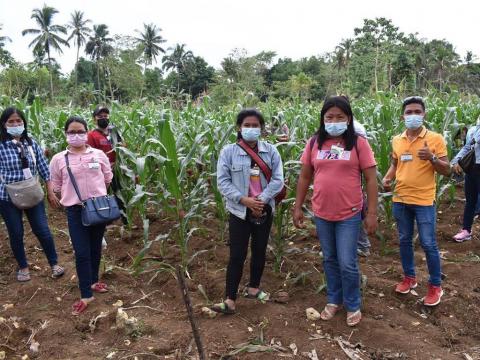Training participants during their visit in a corn-breeder farm in Dimiao, Bohol
TAGBILARAN CITY - The National Corn and Cassava Program is one of the banner programs of the Department of Agriculture that aims to increase the production of quality corn and cassava for human consumption, feeds, and industrial uses as well as empower corn and cassava farmers.
Corn is said to be the second staple food for Filipinos, next to rice. On the other hand, demand for cassava for food and feeds is also increasing. However, there is a concern around the increase of corn and cassava productivity in every agricultural development effort.
With vast improvements in seed genetics, farming practices and technology, the agricultural extension workers (AEWs) play a vital role in disseminating this vital information to the farmers. This is to support them in trying to obtain maximum yield production.
Refresher Course on Corn and Cassava Production Technology for newly-hired AEWs was conducted on 17 – 19 May 2021 at the Bohol Sunset Villa, Tagbilaran City, Bohol. Seventeen (17) AEWs from the municipal agriculture offices of Anda, Bien Unido, Bilar, Calape, Candijay, Carmen, Danao, Dimiao, Getafe, Inabanga, Mabini, Sagbayan, San Miguel, Siera Bullones, Tubigon and Ubay participated in the 3-day training.
Overall, the training aims that the participants will be able to gain knowledge and skills on extension and the technical activities in corn and cassava production for sustainable agricultural development. In detail, participants learned cultural management practices of corn production, corn-based farming system, mycotoxin prevention and control for corn, and cassava production and its management.
Participants visited a corn breeder farm in Dimiao where corn breeding was tackled. The corn farmer shared his personal experiences and tips on corn management and production.
The training has an extension delivery service component which aims at instilling the crucial role of extension workers in bridging research-based information to the farmers. They were taught on what extension is, its approaches, strategies, and methodologies.
“My technical learnings on cassava and corn production are important and should be shared with farmers. My gained knowledge on extension delivery services from this training will contribute a lot on how I can effectively communicate technical knowledge to our farmers,” said Artemia Hamo – one of the training participants.
Should there be any clarifications or inquiries around this training, you may contact Jeffrey O. Awas, Project Officer, via jeffreyawas@gmail.com.

